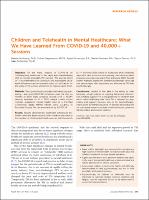Please use this identifier to cite or link to this item:
https://hdl.handle.net/20.500.12202/9427| Title: | Children and telehealth in mental healthcare: What we have learned from COVID-19 and 40,000+ sessions |
| Authors: | Zemon, Vance Hoffnung, Gabriel Feigenbaum, Esther Schechter, Ayelet Guttman, Daniel Schechter, Isaac 0000-0003-4048-6618 |
| Keywords: | COVI-19 contemporary healthcare telehealth (TH) |
| Issue Date: | 2021 |
| Publisher: | John Wiley |
| Citation: | Hoffnung, G., Feigenbaum, E., Schechter, A., Guttman, D., Zemon, V., & Schechter, I. (2021). Children and telehealth in mental healthcare: What we have learned from COVID-19 and 40,000+ sessions. Psychiatric Research and Clinical Practice, 3(3), 106–114. https://doi.org/10.1176/appi.prcp.20200035 |
| Series/Report no.: | Psychiatric Research and Clinical Practice; ;3(3) |
| Abstract: | Objective Of the many impacts of COVID‐19 on contemporary healthcare is the rapid and overwhelming shift to remote telehealth (TH) service. The precise effect of TH on treatment is yet unknown, and the possible child/adult differences are an essential point of clarification for the utility of TH services and efforts to improve upon them. _Methods_ The current study considers data reflecting pre‐, during‐, and post‐COVID‐19 lockdown over the first six months of 2020. Data comprise records of N = 43,294 services delivered to N = 2520 unique clients across multiple outpatient mental health sites at a Certified Community Based Mental Health Clinic (CCBHC) in Rockland County, NY, an area hard hit by COVID‐19. _Results_ Results demonstrate significant differences between child and adult sessions with a relative decrease in the number of child mental health services with the switch to TH in March 2020 (onset of lockdown) and a relatively rapid shift back to face‐to‐face among child services when in‐person services resumed in May and June 2020. Results further highlight significant differences between child age and service type, with psychiatry less affected by TH than psychotherapy. _Conclusions_ Implicit in the data is the ability to offer remotely, a high volume of ongoing behavioral intervention. Findings support TH as less preferred for children than adults while indicating that child TH is favored for psychiatry and support services, less so for psychotherapy. Implications for enhancing child TH delivery and directions for continued research include relational factors, platform (phone/video) and screen salience. |
| Description: | Scholarly article / Open Access |
| URI: | https://prcp.psychiatryonline.org/doi/10.1176/appi.prcp.20200035 https://hdl.handle.net/20.500.12202/9427 |
| ISSN: | 2575-5609 |
| Appears in Collections: | Ferkauf Graduate School of Psychology: Faculty Publications |
Files in This Item:
| File | Description | Size | Format | |
|---|---|---|---|---|
| zemon 2021 OA Children and telehealth.pdf | 468.91 kB | Adobe PDF |  View/Open |
This item is licensed under a Creative Commons License

